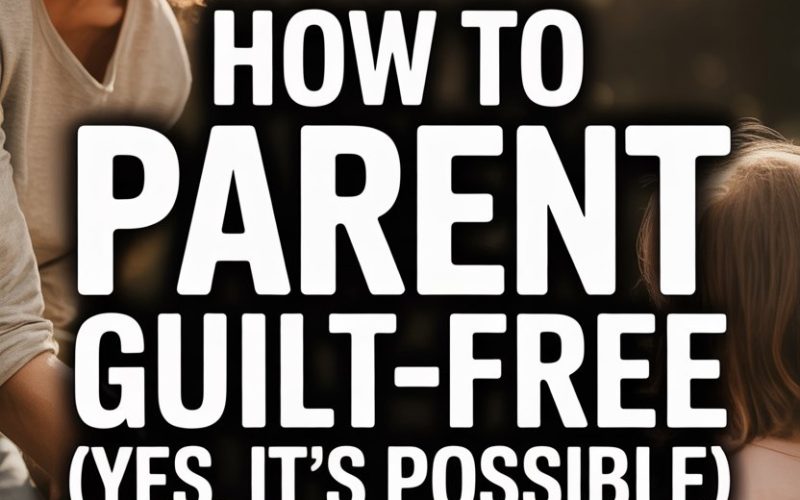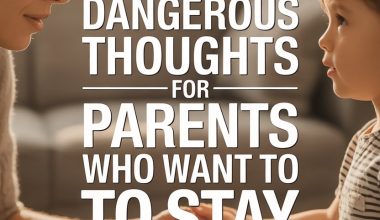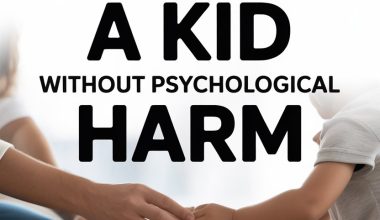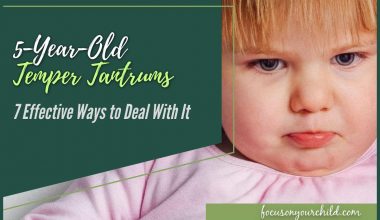Unless you’re reading this while hiding in the bathroom from your toddler, you probably already know parent guilt is as sticky as a lollipop handed to a two-year-old.
It clings. It follows you to work, to bed, and—if you’re particularly lucky—to the grocery store where you run into that one mum from school whose cupcakes are always, somehow, gluten-free and hand-piped.
Good news: parenting without guilt isn’t a myth.
Not even for the time-poor, sleep-deprived, multi-tasking experts we call parents. If your inner critic is louder than your child after a double espresso (please don’t ever), you’re in the right place.
Where Guilt Sneaks In
Parenting guilt is a chameleon. Sometimes it looks like missing a bedtime story, sometimes like resorting to fish fingers three nights in a row.
It pops up when you’re scrolling Instagram and spot that friend doing a family yoga session while your kids argue over who gets the “good” iPad.
Research shows that guilt has a way of worming into your day thanks to social comparison, unrealistic expectations, and the enduring lie that “good parents” are always self-sacrificing and perfect.
Spoiler: they aren’t. And neither are their children.
Redefine What ‘Good Parent’ Even Means
“Am I doing enough?” is usually guilt’s opening act. But whose definition of “enough” are you using?
Many of us inherited ideas about perfect parenting from our own childhoods, magazines, or that one neighbour who always has matching socks (for herself and her kids).
Real talk: there’s no universal checklist. Researchers stress that kids don’t require superhuman parents.
What they need is someone who’s usually present, mostly loving, and sometimes just surviving.
A 2015 study from the University of Washington actually found that kids thrive with “good enough” parenting—which is a real, scientific term.
Turns out, being imperfect allows your children to learn resilience and self-reliance too.
Spot the Guilt Triggers—And Name Them
Awareness is the ultimate buzzkill for guilt. Naming why you feel like you’re failing flips the script.
Did you shout at your child this morning? Did you forget the class bake sale…again? Identify the specific thought (“I’m a terrible parent because…”) and check if it holds water.
A therapist might call this “cognitive reframing,” but you can call it “catching yourself in the act of self-bullying.” Ask if you’d expect the same from a friend—odds are, you’d let them off the hook much faster.
Comparison is a Thief—Lock It Out
Social media is a beautiful, terrible place. For every relatable mum-fluencer sharing her laundry mountain, there are three more posting photos of their four-year-old’s bento box and Montessori playroom.
Dr. Susan Newman, psychologist and author, reminds us that “comparing yourself to others zaps your confidence and makes you feel inadequate.”
Your child doesn’t care that the neighbour’s kid can spell “aardvark” in Mandarin. They care you tried to spell “aardvark” during dinner.
When you notice comparison bubbling up, phone a friend, cuddle your child, or scroll to that dog who looks like a croissant—anything that reminds you the highlight reel isn’t the full story.
Small Wins Beat Perfection
Perfectionism is a breeding ground for guilt. If your to-do list reads like a manual for assembling Ikea furniture—with a crying toddler in one arm—something’s got to give.
What if you celebrated the tiny stuff? A Harvard study on positive psychology suggests noticing small daily wins increases overall happiness and resilience.
Maybe you got everyone out the door mostly dressed. That counts. Ate dinner together one night this week? Gold star.
Lower the bar, not the love.
Set Boundaries With Everyone (Including Yourself)
Your boss needs you. Your kids need you. The school WhatsApp group needs you. But there’s a limit—honestly.
Saying “no” is a parenting superpower. Want proof? Psychologist Dr. Vanessa Lapointe points out that setting boundaries models emotional health for your children, too.
It teaches them it’s normal to have limits, and it’s brave to communicate them.
Reserve time for yourself, even if it’s five minutes of peace with a cup of tea in the garden. You’ll return far less likely to bite someone’s head off (unless they take the last biscuit).
Own Your Mistakes—Then Move On
Ever shouted when you meant to whisper? Fed them cereal for tea, twice? We all have. Mistakes are inevitable, and apologising to your child can be downright healing for you both.
Parenting expert Dr. Justin Coulson suggests that a simple “I’m sorry, I was tired and snapped” is enough to restore connection—and remind your child that grown-ups mess up, too.
No need to grovel. Just acknowledge, repair, and move forward. Kids are forgiving little creatures (especially if you sweeten the deal with a cuddle).
Find Your Own Version of Self-Care
Self-care is not always scented candles and weekend yoga retreats. Sometimes it’s hiding chocolate behind the frozen peas or saying yes to the 20-minute screen break that lets you shower in peace.
Experts like Carla Naumburg, PhD, encourage parents to redefine self-care as anything that helps you feel human, even just for a few minutes.
This could mean a phone call to a mate, reading a trashy novel in the loo, or simply locking the door and breathing.
Self-care, as it turns out, is the opposite of selfishness. When your cup is slightly more than empty, you have more patience and perspective for those little humans who keep leaving their shoes on the stairs.
Stop Apologising for Your Parenting Style
Parenting trends come and go. One minute, it’s all about “gentle parenting,” the next it’s “free-range children” and “screen-free everything.” These are guidelines, not gospel.
Your family, your rules. If your approach works for your household and your kids are safe and loved, you have permission to ignore the latest trend.
If all else fails, blame your dog. (“Sorry, we run on ‘chaotic good’ energy around here—ask the dog.”)
Delegate Like a Boss
If you’re juggling nappies, spreadsheets, and remembering who likes their toast crusts removed, delegation becomes survival, not luxury.
Get the kids involved—even the little ones. A 2016 Stanford study found that children who help out at home build self-esteem and a sense of belonging.
Assign simple tasks, let partners pull their weight, and don’t be shy about outsourcing the things you loathe (hello, online grocery shopping).
No medals are awarded for martyrdom, but you might snag an extra 10 minutes to put your feet up.
The Guilt-Free Legacy
What if your children remembered you not for always being perfect, but for being present and forgiving—with them and with yourself?
Taking the guilt out of parenting doesn’t mean lowering your standards for care or love. It means ditching the myth that only one way works, or that everyone else has it together.
The next time guilt sidles up, ask yourself: Is this really about my child’s needs, or about my own expectations?
If the latter, give yourself a break. Your kids don’t want a robot—they want you, mismatched socks and all.
Besides, the only “perfect” parent is a fictional one. And they’re probably played by an actor who never had to wipe jam off a light switch.
Enjoy the ride. You’ve got this.




